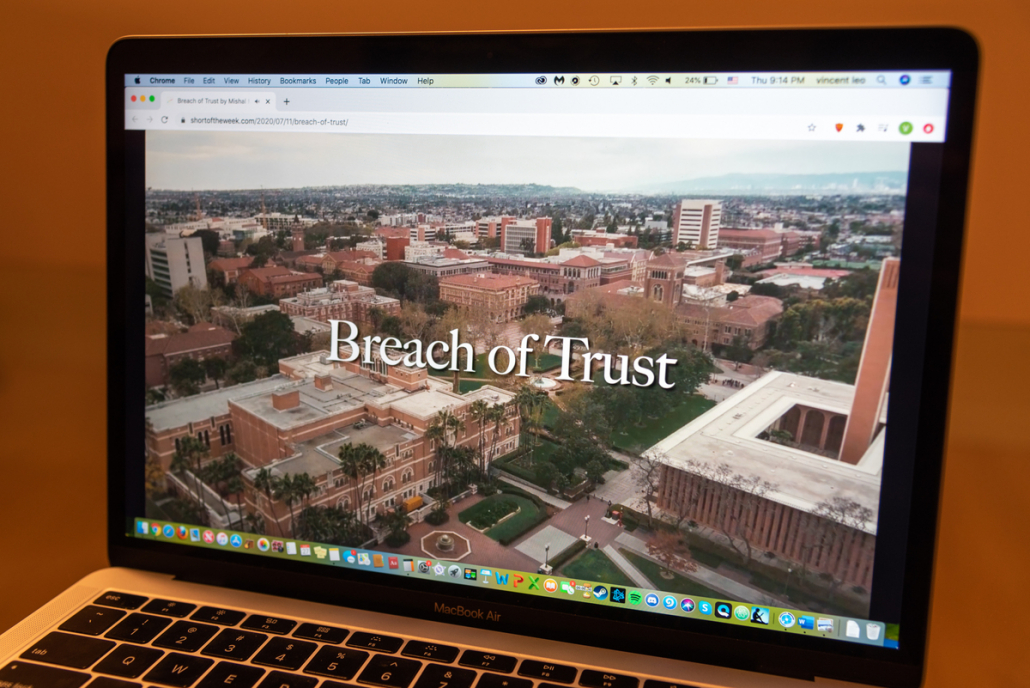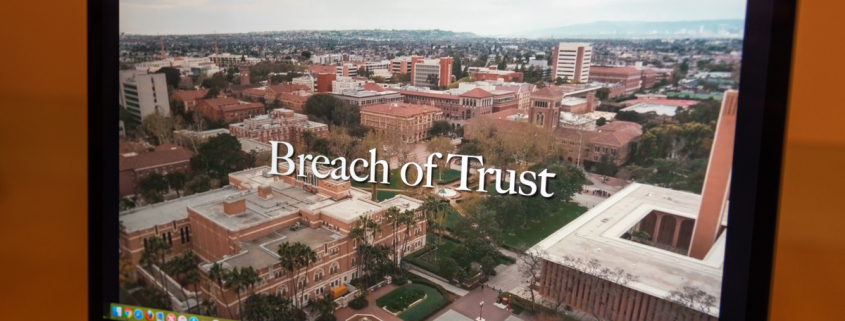Alumna premieres Tyndall documentary online

Content warning: this article contains references to sexual assault and sexual abuse.
Between press conferences on campus and news stories from sexual assault survivors being shared for the first time publicly, Mishal Mahmud, in her final year of her master’s degree in film and TV production at the time, was entirely shocked at the information that was coming to light.
She, like many other USC students, learned of the details of the case against George Tyndall — a former campus gynecologist in the USC Student Health Center who was accused of sexually abusing dozens of women — in a 2018 Los Angeles Times investigation. Mahmud felt she had no choice but to help increase the situation’s visibility as well. Over the course of two semesters, she and her production team created “Breach of Trust,” a short documentary completed in May 2019 about the case and the subsequent cover-up by USC administration, centered around the testimonies of the women involved.
An online premiere was held July 11 following the film’s best documentary win at the First Look 2020 Industry Awards and its inclusion on the BAFTA 2020 student film shortlist.
Once Mahmud started talking to some of the women about their experiences with Tyndall in 2018, she knew she needed to make the documentary.
They were all so wonderful and so willing to tell their story, and it developed from there,” she said. “I can’t think of a better use of my time at USC than to pursue this project.”
Kara Fein, a 2019 graduate with a master’s degree in film and TV production, worked as a co-editor on the film and attested to the raw power of the testimonies. Listening to Cindy Gilbert, who was the former nurse supervisor that first reported the abuse happening in Engemann, was especially impactful for Fein.
“I think understanding what was really going on in the Health Center, how people’s voices were being suppressed and how her job was threatened, [were] things I didn’t really know about,” Fein said. “What happened to Cindy and anyone who worked at Engemann, who was trying to come forward, who was being silenced [they are] survivors, too.”
“Breach of Trust” was developed during Fall 2018 then production commenced during the second semester of “Production III, Documentary,” a class where students pitch their film concepts, with three being selected for production.
“The passion of the students to do this, I think, was one of the factors that influenced our selection,” said Mark Harris, a professor at the School of Cinematic Arts who oversaw direction for the project. “[It] was proposed by the students, it was clearly an issue that concerned them, and the faculty felt that it was an important issue for the [University].”
The film, which clocks in at 24 minutes, begins with Oprah’s 2018 commencement speech against the backdrop of graduates celebrating at the Annenberg School for Communication and Journalism, which then cuts to a solemn interview with Matt Hamilton, the Los Angeles Times journalist who first covered the case. The same juxtaposition with the testimonies of victims and whistleblowers and the vibrant appearance of campus is created later in the film as well, with sweeping shots of the Center for International and Public Affairs.
“We wanted to explore how this case reflected the culture of USC at large,” Mahmud said. “I think universities are very brand conscious, especially private universities like USC that are very big on fundraising … [but] the way that you respond and handle cases like this are what really define you. And that’s where the imagery of the campus came into play.”
The film is structured to highlight the two scandals that occurred simultaneously: the cover-up by USC and the abuse itself, articulated through several interviews. Harris believes that a key strength of the film was the interviews that Mahmud conducted.
“In the beginning, Cindy only agreed to do an audio interview, [but] Mishal kept going back to Cindy and gradually persuaded her and gained her confidence to be able to appear in the film,” Harris said. “And that’s a testament to Mishal’s patience.”
The crew encountered some challenges in production, such as when an interview with former Interim President Wanda Austin did not ultimately come to fruition, Fein said.
“We were expecting [the interview]. As editors we’re like, ‘OK, we’re gonna use it in this way, or maybe we’ll use it in this way,’” Fein said. “We can’t wait to see what comes back [from the interview] so that we have an understanding of where the school is coming from. And then … [they] chose not to contribute. And that was really disappointing.”
According to a USC media representative, the University is unable to confirm past correspondence of previous senior officials, including the communication between former interim President Austin and the documentary’s team.
Despite being a candidate for several awards, this was not the primary goal, as it was meant to create more discussion surrounding the case, Harris said.
“Well, I’m happy,” Harris said. “I’m always happy the students get validation for their work. I think for me, my disappointment is that the film has not been widely shown [to the] University.”
For those who see the film for the first time, particularly administrators, Fein hopes that they begin to understand the long-term trauma that a lack of transparency can create in situations of abuse.
“I hope that they understand … the sort of everlasting pain that they can inflict as an institution,” she said. “[This incident] covered decades from when Dana was at the school, [it] was a long time ago. When Amanda was at the school, it was a long time ago. And then we had two current students. So that’s 30 years of this happening.”
However, beneath the gravity of the case, Mahmud found hope.
“What we encountered were … people who gave us so much hope about the USC community,” Mahmud said. “Maybe the people in power were failing us. But there were students, there were employees, there were professors, who were all really coming together and demanding accountability.”

